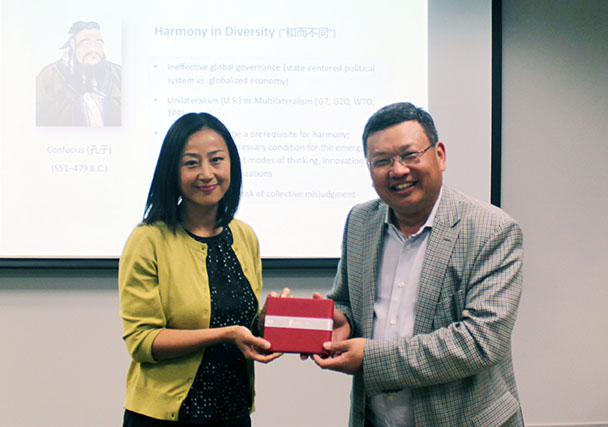Taking a cue from Confucius, CKGSB Founding Dean and Professor of China Business and Globalization Xiang Bing is championing “encouraging different dreams” as the key to China’s future success.
Hosted by the Stanford Center for Professional Development, Dean Xiang gave a wide-ranging, impactful lecture on “China’s Forthcoming Transformation and Its Potential Global Implications” at the Jen-Hsun Huang Engineering Center on April 29, 2015.

Chun-Mei Zhao, Director of China Programs at Stanford Center for Professional Development, with Dr. Xiang Bing, CKGSB Founding Dean at Stanford on April 29, 2015
Some key topics that had an audience made up of Stanford faculty, senior administration, students and Silicon Valley executives buzzing:
Income Wealth Inequality
Looking at the most recent GINI coefficient data available, China is among the world’s worst regarding income wealth inequality, up there with Brazil and the US. Some independent data would even suggest that China is probably the worst among any economy, Dean Xiang said.
This gap between the country’s rich and poor is “the biggest problem” facing Chinese President Xi Jinping’s new government, according to Dean Xiang. It is also the reason, Dean Xiang said, that the government would like to slow down the rate of economic growth. If the economy continues such rapid growth, the income gap will grow wider and people will be unhappy, he said.
Dean Xiang believes that to address this inequality, there will be a convergence to the middle of three major models of economic development: social democracy, capitalism and neoliberalism. Too much of any one model on its own leads to instability, but together there can be balance, he said.
Innovation, he said, is also essential to shrinking the gap between the rich and the poor. To achieve this, Dean Xiang looks to one of his favorite notions from Confucius. “Confucius has a famous saying that when everybody chases after the same dream, you cannot have a harmonious society. You need to promote different dreams,” Dean Xiang said.
In China, there tends to be a homogenous obsession with lowballing prices, a model that favors imitation over innovation. “The differences in dreams, the different pace of life, the different ways of relating are essential for different talents to emerge,” Dean Xiang said.
Data Accuracy
In the past, the accuracy of China’s economic data has been called into question. Today, Dean Xiang said, the quality of the data is improving for two key reasons:
“There’s no doubt that data is getting better,” Dean Xiang said.
US/China Relations
“We spend too much time looking at our differences and not enough time looking at our common interest,” Dean Xiang said. The income wealth inequality problem unites both countries and they must work together to solve it, he said.
The US should remember that China is a country with a very long history and it could do well to study the “experiments” that China has undertaken, Dean Xiang said. “China has a rich experience of different systems. We’ve experimented with communism, feudalism, capitalism and state capitalism.”
He pointed to China’s long cycle of dynasty changes that have taken place roughly every 300 years. The pattern shows that when money and power grow together too quickly, a regime change occurs. Dean Xiang shared his concerns that the income inequality in the US today could put the country on a path toward regime change.
“There is much to learn from (China),” Dean Xiang said.
The US and China must also work together to push for globalization. Dean Xiang said he founded CKGSB in part to build a bridge between the two nations by allowing a free and open exchange of information. In looking to the future, “we need to build a global learning community. We need to stay humble. We need to learn.”